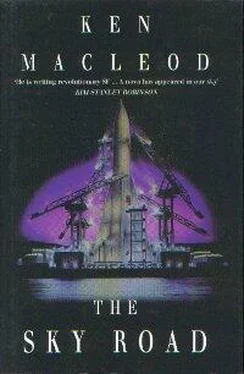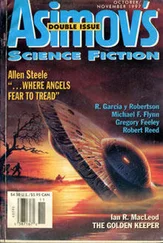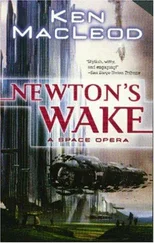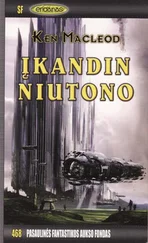Ken Macleod - The Sky Road
Здесь есть возможность читать онлайн «Ken Macleod - The Sky Road» весь текст электронной книги совершенно бесплатно (целиком полную версию без сокращений). В некоторых случаях можно слушать аудио, скачать через торрент в формате fb2 и присутствует краткое содержание. Год выпуска: 1999, ISBN: 1999, Издательство: Orbit, Жанр: Фантастика и фэнтези, на английском языке. Описание произведения, (предисловие) а так же отзывы посетителей доступны на портале библиотеки ЛибКат.
- Название:The Sky Road
- Автор:
- Издательство:Orbit
- Жанр:
- Год:1999
- ISBN:1-85723-755-2
- Рейтинг книги:3 / 5. Голосов: 1
-
Избранное:Добавить в избранное
- Отзывы:
-
Ваша оценка:
- 60
- 1
- 2
- 3
- 4
- 5
The Sky Road: краткое содержание, описание и аннотация
Предлагаем к чтению аннотацию, описание, краткое содержание или предисловие (зависит от того, что написал сам автор книги «The Sky Road»). Если вы не нашли необходимую информацию о книге — напишите в комментариях, мы постараемся отыскать её.
The Sky Road — читать онлайн бесплатно полную книгу (весь текст) целиком
Ниже представлен текст книги, разбитый по страницам. Система сохранения места последней прочитанной страницы, позволяет с удобством читать онлайн бесплатно книгу «The Sky Road», без необходимости каждый раз заново искать на чём Вы остановились. Поставьте закладку, и сможете в любой момент перейти на страницу, на которой закончили чтение.
Интервал:
Закладка:
What a laugh she gave. She frightened herself. One of the scampering children playing around them stopped, put his thumb in his mouth and ran away.
“We ran a benign state capitalism, nothing more,” she went on. “In your case, my friend, it was not even that. God, I feel disgusted with myself that we did it, that we ever allowed ourselves to be compradors for Reid’s goddamn private gulags.”
Nok-Yung stared at the sky for a moment. T don’t know what to say, Myra,” he said at last. “Your regret over the Mutual Protection camps is… well taken. But about the other matters—you must surely know that none of what you have been talking about, the USSR and so on, is socialism as we understand it, and as you understood it. So stop confusing the issue.”
“Oh, I’m well aware that you are different. That you may well be the genuine article: Marx and Engels, Proprietors. And you know what? I don’t care. I don’t want it, for myself or for anyone.”
“Why not?” Nok-Yung sounded more puzzled than offended.
Myra pointed across the river to the insectile shape of a fighting-machine, patrolling the water’s edge with heron-like steps.
“Because of those damn things,” she said. “And the calculating-machines.”
“What!” Nok-Yung’s eyes creased up in amusement. “Luddism is not your true ideology, Myra. I cannot believe this. These machines are one of the most marvellous achievements of the Sheenisov—a whole alternative nanotechnology, worked out quite independently of the West. You know how the machines scale down, all the way to the molecular scale, and are all mechanical and chemical and optical, with no need for electronic interfaces? That’s their—our—secret weapon, an open secret. A computer system that the enemy cannot penetrate, but that everyone can understand and access. I’ve just begun to use it, and I tell you, it has the most intuitive interface I’ve ever come across. The capitalists would kill for it. Or rather, they would kill to be able to monopolise it. But it’s free, so they can’t.”
“I know about your strange machines,” Myra said. “The CIA told me all about them.” She tapped her temple, smiling ironically. “ ‘I have detailed files.’ ”
Nok-Yung caught the allusion. “It is not The Terminator, you know! Not—what was it in the films?—Skynet. It is not… inimical.”
“Not now, perhaps. But what will it do, when it—or you-have covered the world, like a banyan tree?”
Nok-Yung spat a puff of air and smoke. “More Luddism! The machines will form a benign human environment, a second nature, within which human nature can flourish, truly, for the first time.” He leaned forward, speaking confidentially. “Let me tell you what we have done, something that no other system would have dared to do. We have nanofac-tured a virally distributed, genetically fixable version of the anti-ageing treatment. It spreads before our migrations like a benign plague. You may be already infected, yourself. A gift.”
“God, that is so irresponsible!” Myra jolted rigid. “Viruses mutate, dammit, in case you hadn’t heard!”
Nok-Yung made a planing motion with his hand. “Not this one. It has self-repair built in. It has tested stable through a million virtual generations.”
“ Virtual generations, yes! Man, you did enough design work in the camp to know what that’s worth in the real world!”
“Different system, different design philosophy,” he said, with infuriating complacency. “Our testing kits are themselves part of the real world. It’s like the difference between a working scale model and a simulation. There is simply no comparison. And the computing resources are vast, vaster even than anything the spacers have yet built.”
Myra felt her gaze sinking into the bottomless pool of his self-confidence. It was truly terrifying; it was, she realised, what she most feared for herself—to be so sure. To be absolutely certain that she was right would, as far as she was concerned, be the end of her. Doubt was her only hope, her comfort and companion since childhood, her scepticism her sole security.
Shin Se-Ha returned and sat down, affecting not to notice their frozen moment of mutual incomprehension. He looked at Myra, gravely, and shook his head.
“No deal, I’m afraid.”
Myra could scarcely believe it.
“Why ever not? The alternative is to fight your way through Kazakhstan! All you have to do instead is not fight us! What more can you ask of us?”
Se-Ha shook his head sadly. “It is not that, Myra,” he said. “It is not aggression, or animosity. It is simply the imperative of our mode of production. It will be global or it will be nothing, as your Trotsky always said. We have to keep running, or fall over, until we meet ourselves, on the other side of the world.”
He saw this wasn’t getting anywhere with her. “More concretely,” he continued, “we can’t have… unassimilated areas within the Union. It would be too much of an opportunity for our enemies. And we can’t stop for long, because that would force us to engage in internal class struggle, particularly with the small-property owners, which we do not want.” He smiled. To put it mildly! We have so far been able to avoid the whole dictatorship of the proletariat scenario by simply carrying the remaining small and large businesses along with us. The machine-based common-property economy expands, and they expand in its interstices. They can live like nits in our hair, as long as we are running. If we stopped, the itch would be intolerable. We would have to… scratch. ”
“Oh, come on,” said Myra. “You can run a mixed economy indefinitely. We’ve been doing it in Kapitsa for years.”
“A mixture of state capitalism and private, yes,” said Nok-Yung, “as you’ve just reminded me. A mixture of a real non-commodity economy and a market is much more unstable. Conflicts arise very rapidly—if they’re both confined to the same economic space.”
An unstable system, that had to expand at just the right speed to stop itself falling over; not too slow, or too fast … there were plenty of natural and artificial and social analogies to that. Myra almost giggled at the thought of what would happen to them if Kazakhstan just surrendered, if the Sheenisov suddenly found themselves pushing at an open door and fell flat on their collective faces.
But that wasn’t an option. She looked around, checking that her guards were still bored and watchful, then back at the two new recruits to the Sheenisov. The absurdity of the situation struck her—she was doing diplomacy by just talking to two guys on the street. For all she knew they could be as deluded as UFO contactees, and not really ambassadors from an alien intelligence at all. Again she felt the urge to giggle—it was just another silly idea; she was feeling light-headed, flighty, as though her problem had been solved. She couldn’t see any solution. She was in deeper trouble than ever, but still she felt relieved.
“There is a certain urgency to it,” Se-Ha was saying, a litde apologetically. “Green factions are experimenting with plague vectors. The spacer groups, the Outwarders, have a radically post-human vision. Between them, they threaten humanity with extinction. Our advance is in essence defensive…”
She looked sharply at him. “Tell me, Se-Ha,” she said, “just who it was you consulted, back there.”
He looked uncomfortable. “It was… a distributed decision. A consensus.”
“Bullshit!” she snapped. “Don’t give me that. I didn’t see a vote being taken in the streets around here. Did you? So there must be a leadership somewhere, a council. I want to talk to it.”
Читать дальшеИнтервал:
Закладка:
Похожие книги на «The Sky Road»
Представляем Вашему вниманию похожие книги на «The Sky Road» списком для выбора. Мы отобрали схожую по названию и смыслу литературу в надежде предоставить читателям больше вариантов отыскать новые, интересные, ещё непрочитанные произведения.
Обсуждение, отзывы о книге «The Sky Road» и просто собственные мнения читателей. Оставьте ваши комментарии, напишите, что Вы думаете о произведении, его смысле или главных героях. Укажите что конкретно понравилось, а что нет, и почему Вы так считаете.











